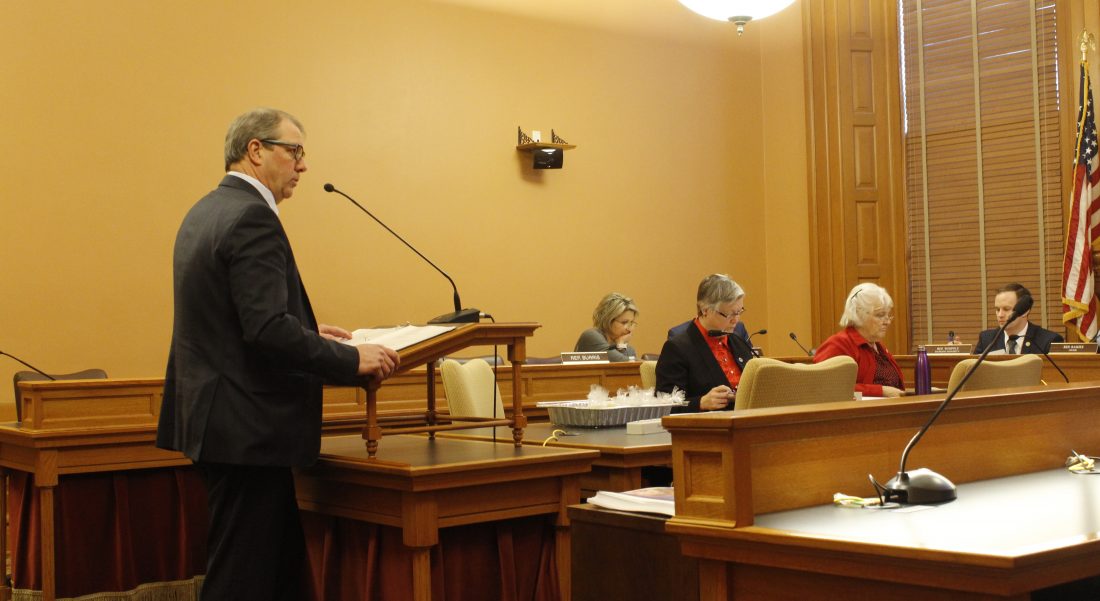State university leaders: Gov. Kelly’s proposed $9M increase for higher education ‘not enough’

photo by: Dylan Lysen
University of Kansas Chancellor Douglas Girod, right, speaks with Kansas State University Provost Charles Taber after a Kansas House of Representatives higher education budget committee meeting at the Kansas State Capitol on Thursday, Feb. 14, 2019. Both Girod and Taber provided testimony to the committee to help it craft the state's budget.
Topeka — Gov. Laura Kelly’s proposed $9 million increase in higher education funding will not cover the cost of annual inflation at the University of Kansas, and the university will be forced to raise tuition next year if it doesn’t get more support from the state, KU Chancellor Douglas Girod told state legislators Thursday.
Along with Kansas State University Provost Charles Taber, Girod testified in a Kansas House of Representatives higher education budget committee meeting, explaining the complicated environment higher education finds itself in after years of declining funding from the state.
Of the $9 million that Kelly proposed, about $2.8 million of it would be allocated to KU, according to the Democratic governor’s proposed budget. But Girod said the university is expecting to see about a $3 million increase in its costs due to inflation this year, meaning the university would again need to raise tuition next school year to cover the cost.
“We don’t have wiggle room on tuition at this point,” Girod said after describing KU as “the most expensive university in the Big 12.”
In actuality, private institutions Baylor University and Texas Christian University have the highest tuition rates in the Big 12. Next year, TCU’s annual tuition will be $49,160 and Baylor’s will be $42,842, according to the universities’ websites. The highest in-state tuition at a public Big 12 university is at the University of Texas, which is $10,922 annually for the current school year, according to the UT website. KU’s tuition rate for in-state students for the current school year is $10,182, according to the university’s website.
Joe Monaco, a spokesman for KU, said in an email to the Journal-World that Girod’s comments referred only to public universities and took student fees into account along with tuition. Monaco said the university refers to data compiled by Association of American Universities Data Exchange when it says it’s the most expensive public university in the Big 12, and that the data there shows that tuition and fees at the University of Kansas total about $500 more than at Texas.
• • •
Since fiscal year 2009, Kansas’ state universities have seen about a $69 million drop in state funding, according to the Kansas Board of Regents. KU’s state funding has fallen by about $28 million in that time, Girod said.
Additionally, KU is currently facing a $20 million budget cut, which Girod said would require the university to eliminate 60 faculty and 100 staff members over the next few years.
“These are very real challenges to the university,” Girod said.

photo by: Dylan Lysen
University of Kansas Chancellor Douglas Girod speaks to the Kansas House of Representatives committee for higher education budget. Girod asked the committee to consider investing more into higher education to help slow down the rate of tuition increases.
K-State’s Taber agreed with Girod’s assessment.
“We certainly appreciate the governor’s recommendation,” he told the committee. “We think that’s a good start, (but) it’s not enough.”
Kelly’s proposed increase would move the higher education funding level back to what it was in 2016, prior to a $30.7 million cut that then-Gov. Sam Brownback made to help offset the state’s budget crisis. In 2017, lawmakers restored $6 million of that amount and then restored another $15 million in 2018.
But the Kansas Board of Regents — which represents KU, K-State and other state universities — asked lawmakers to increase higher education funding by $50 million for this legislative session and another $35 million next session. Girod told the Journal-World that about $28 million of that two-year, $85 million increase would be allocated to the KU system, which includes the medical center in Kansas City, Kan.
If KU were to receive that allotment, Girod said it would help the university stabilize its tuition by allowing it to only increase at the rate of inflation, which Girod called “critical.” He also said an investment in higher education from the state would help the university reach its goal of having more than 50 percent of its graduates leave college without debt.
“If you restore (funding) back to 2008 levels in the next couple of years, we should be able to toe the line on tuition, absolutely,” Girod said. “But without the additional dollars this year, that’s going to be tough.”
• • •
Some lawmakers also brought up the issue of how universities fit in with the state’s need to increase K-12 funding, which is still millions of dollars away from satisfying a Kansas Supreme Court ruling.
State Rep. Blake Carpenter, R-Derby, asked Girod whether he thought higher education should be included in the Kansas Constitution’s provision that mandates equitable and adequate funding for education in the state.
Girod said that’s a question for lawmakers, not university leaders.
“That’s ultimately your philosophical decision,” Girod told Carpenter. “But I don’t believe you can continue to not invest in higher education for another decade and expect to have a reasonable economy in this state.”
Carpenter said he agreed, but he noted K-12 education is fighting for the same funds.
“Hopefully we can figure out a way to get you those funds, but we only have a limited number of resources,” he said.
Contact Dylan Lysen
Have a story idea, news or information to share? Contact University of Kansas, higher education, state government reporter Dylan Lysen:
- • dlysen@ljworld.com
- • 785-832-6353
- • Twitter: @DylanLysen
- • Read other stories by Dylan







